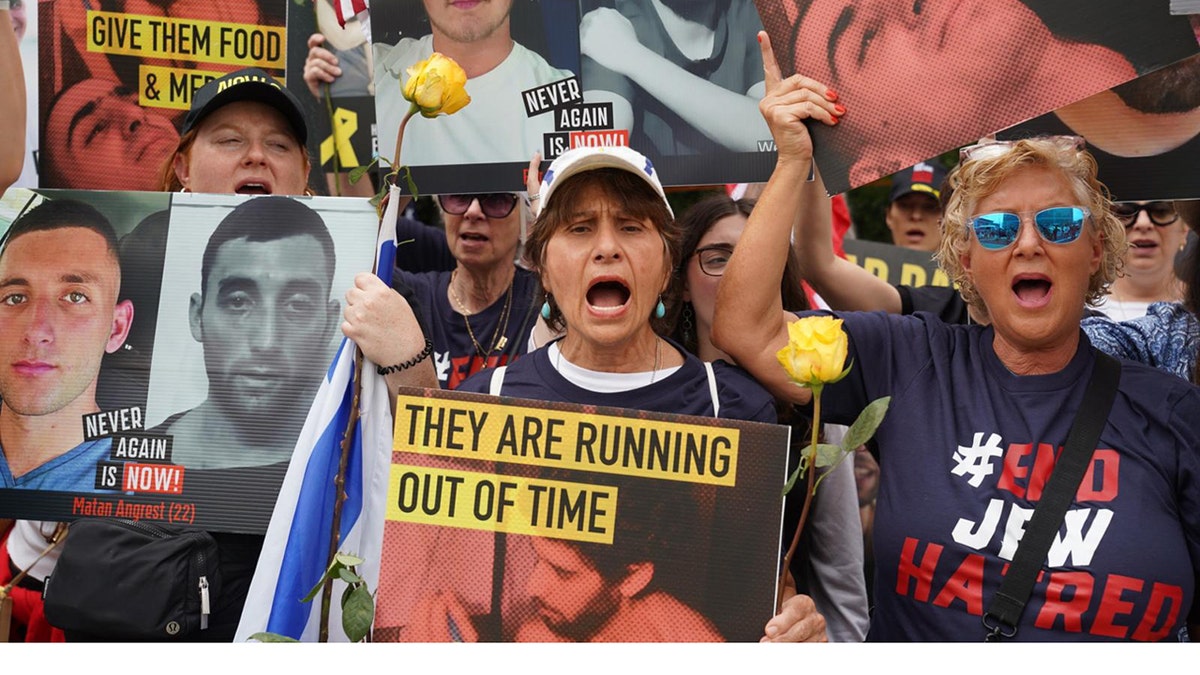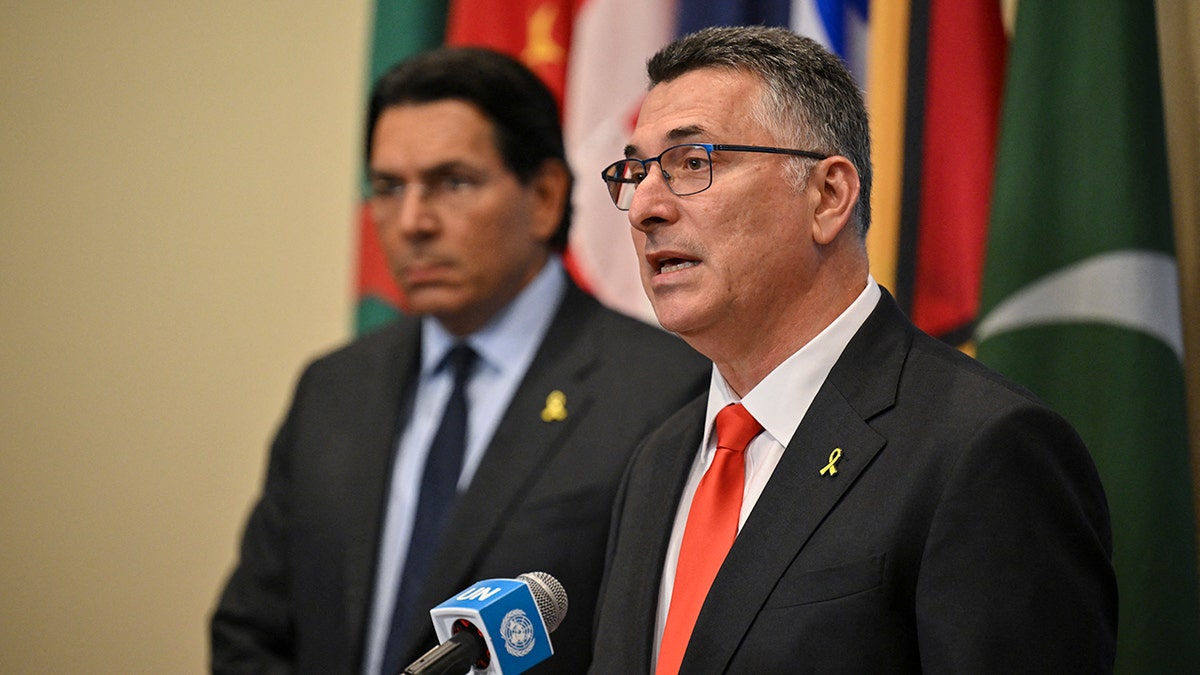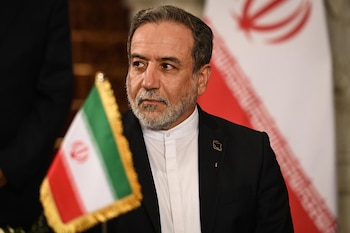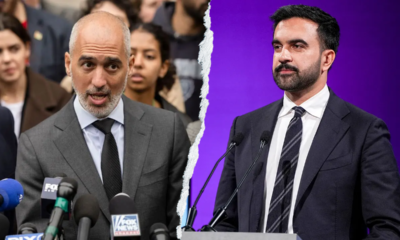INTERNACIONAL
Brother of Israeli hostage urges UN to act after video shows Hamas starving and torturing captives

NEWYou can now listen to Fox News articles!
Ilay David, the brother of 22-year-old hostage Evyatar David, delivered an emotional plea to the United Nations Security Council on Tuesday, calling for urgent international action after a horrific new video showed his emaciated brother being forced to dig his own grave inside a Hamas tunnel.
The Security Council session was requested by Israel and comes as the country stands on the verge of a full annexation of Gaza — a move prompted by the collapse of ceasefire talks and the release of disturbing images of starving hostages.
Evyatar David was abducted from the Nova music festival on Oct. 7, 2024. In the newly received footage, he appears frail — reduced to just 90 pounds — and is seen struggling to speak.
NETANYAHU RESPONDS AFTER ISRAELI HOSTAGE SEEN EMACIATED, DIGGING GRAVE: ‘CRUELTY OF HAMAS HAS NO BOUNDARIES’
Members of the United Nations Security Council listen as Ilay David, brother of hostage Evyatar David, and holds up a photo of his brother in captivity as he speaks during a meeting called by Israel. (Michael M. Santiago/Getty Images)
Holding up a still from the video, Ilay David described a haunting visual: «As my younger brother, a living skeleton, was forced to speak and dig his grave, the chubby and well-fed hand of a Hamas terrorist entered the frame. Suddenly, Hamas confirmed what we have known for months — the terrorists have plenty of food. The only ones starving in Hamas’ tunnels are the hostages: my brother, Guy, and the [49] others.»
«My mother and I could not bring ourselves to watch it,» he said, speaking remotely via Zoom, «But my father and sister did. And now the images haunt them.»
Citing testimony from former hostages — including Tal Shoham, whose account was first published by Fox News Digital — David said the terrorists remain in nearby rooms while deliberately starving captives as part of a «sick and twisted propaganda campaign.»
«This is a humanitarian crisis — the crisis of the hostages — that is not being discussed here,» he said. «Not in the Security Council, and not in other U.N. forums. The very soul of humanity is being scarred by Hamas’s barbaric actions.»

Protesters rallied near the United Nations, demanding immediate medical care and the release of hostages held by Hamas. (Yoav Ginsburg/Hostages and Missing Families Forum)
TRUMP: HAMAS SURRENDER, HOSTAGE RELEASE IS ‘FASTEST WAY’ TO END GAZA WAR
The meeting of the U.N. Security Council was convened following the release of the latest hostage video. Israel believes that as few as 20 hostages remain alive in Hamas captivity — many in critical condition, with only days left to live.
Israel’s Foreign Minister Gideon Sa’ar, who attended the session in New York, emphasized ahead of the meeting that while Israel continues to facilitate humanitarian aid into Gaza, Hamas is deliberately starving the hostages.
«Evyatar was forced to dig his own grave. This is satanic,» he said. «These are evil crimes — like those committed by the Nazis and ISIS.»

Israeli Foreign Minister Gideon Saar (R) and Israeli Ambassador to the U.N. Danny Danon (L) speak to journalists ahead of a United Nations Security Council meeting at U.N. headquarters on August 5, 2025 in New York (ANGELA WEISS/AFP via Getty Images)
Sa’ar also warned that recent moves by several nations to unilaterally recognize a Palestinian state have emboldened Hamas and undermined negotiations.
«They gave Hamas free gifts and an incentive to continue this war,» he said. «They directly assassinated the hostage deal and ceasefire. These countries prolonged the war.»
Ilay David ended his address with a desperate appeal: «We, the family of Evyatar, refuse to give up hope. We are weeping, we are suffering, but we are also fighting with every fiber of our being. We will not give up until we see him back home — until my mother and father can hug him again.»
CLICK HERE TO GET THE FOX NEWS APP
«To the leaders of the world, to every member of this Council, and to the global community: Your silence in the face of this monstrous cruelty is complicity. I urge you — do not let them die. Act now, before it’s too late. Save Evyatar David. Bring my little brother home.»
When asked by reporters at the White House on Tuesday if he had seen the Hamas video of Evyatar David, President Donald Trump said he had, calling it «horrible.»
anti semitism,israel,united nations,terrorism,conflicts
INTERNACIONAL
Tensión en Yemen: los separatistas ratificaron que buscarán la independencia tras sus victorias en el campo de batalla

Las fuerzas separatistas del sur de Yemen han consolidado su control sobre amplias zonas del territorio este mes, intensificando los cambios en el mapa político de un país marcado por más de diez años de conflicto armado. Según declaraciones de Anwar Al-Tamimi, portavoz del Consejo de Transición del Sur (STC, por sus siglas en inglés), recogidas por AFP, el movimiento mantiene su objetivo de establecer un nuevo Estado, aunque la secesión se llevará a cabo únicamente cuando las circunstancias sean propicias. Los acontecimientos recientes han incrementado la determinación de los separatistas, quienes aseguran estar preparados para restaurar el antiguo Estado del sur en el momento que consideren adecuado, ya sea a corto, medio o largo plazo.
La ofensiva relámpago de diciembre permitió al STC tomar casi todo el territorio que abarcaba el antiguo Yemen del Sur, que existió como Estado independiente entre 1967 y 1990, antes de su unificación con el norte.
A pesar de una serie de ataques aéreos dirigidos contra sus posiciones y de la presión diplomática de Arabia Saudita para que cedan el control de las áreas recientemente capturadas, en especial las situadas a lo largo de la frontera meridional, el STC ha reiterado su intención de mantener y fortalecer sus posiciones. “Lo sucedido recientemente ha hecho que los sureños estén más decididos —psicológica y emocionalmente— a restaurar el Estado”, afirmó Tamimi en una entrevista en Abu Dabi con AFP. El portavoz subrayó que el calendario para la secesión dependerá de factores históricos, internacionales y regionales.
Fuentes citadas por AFP indican que los recientes logros militares del STC han sido motivo de incomodidad para Arabia Saudita, principal apoyo del gobierno yemení reconocido internacionalmente. Riad ha exigido en reiteradas ocasiones la retirada del STC de los territorios ocupados y ha intensificado sus operaciones aéreas en la zona. Además, la coalición saudí atacó el martes un presunto cargamento de armas procedente de los EAU en un puerto controlado por el STC y solicitó a Abu Dabi la retirada de sus fuerzas de Yemen en un plazo de 24 horas, a lo que los Emiratos accedieron.
La coalición liderada por los EAU que integra el STC mantiene desde hace años la aspiración de restablecer el Estado del Sur. Actualmente, el STC controla más territorio que cualquier otra facción individual en el fragmentado escenario político yemení.
Las tropas de Emiratos Árabes Unidos (EAU) comenzaron a abandonar este miércoles el aeropuerto internacional de Al Riyan-Mukalla, en la provincia de Hadramut, al este de Yemen, tras recibir un ultimátum de Arabia Saudita relacionado con el supuesto apoyo emiratí a los secesionistas del sur, según informó la televisión oficial yemení, medio bajo control del Gobierno reconocido internacionalmente. La retirada, que incluye el despegue de cuatro aviones de carga militar con cientos de soldados, equipo pesado y sistemas técnicos, se produce en un contexto de escalada de tensiones entre los gobiernos de Yemen y EAU, ambos miembros de la coalición militar liderada por Riad.
La televisión oficial yemení, que ayer había dado un plazo de 24 horas para la salida de las fuerzas emiratíes, afirmó que este movimiento busca “reorganizar el despliegue militar y garantizar la gestión de instalaciones vitales bajo el paraguas de la coalición militar” liderada por Arabia Saudita.
Imágenes de aviones militares despegando del aeropuerto de Al Riyan circularon en redes sociales y fueron citadas por la televisión yemení como corroboración de la retirada, aunque dichas imágenes no han podido ser verificadas de manera independiente. Hasta el momento, las autoridades de EAU no han realizado declaraciones públicas respecto a estos acontecimientos.
La retirada tiene lugar tras la decisión de Rashad al Alimi, líder del Consejo de Liderazgo Presidencial y máximo representante del Gobierno yemení, de cancelar un acuerdo de defensa con Abu Dabi y ordenar la salida inmediata de todas las fuerzas emiratíes del territorio yemení. Al Alimi instruyó además a las autoridades locales para que asumieran el control de las instalaciones militares y de seguridad que hasta ahora estaban bajo supervisión emiratí.
Las fricciones recientes han estado motivadas por el respaldo de EAU al Consejo de Transición del Sur (CTS), grupo separatista que controla extensas áreas del sur de Yemen, incluida Adén, sede provisional del Gobierno yemení tras la ocupación de Saná por los rebeldes hutíes hace más de una década. Tanto la coalición liderada por Arabia Saudita como oficiales yemeníes han acusado por primera vez a EAU de apoyar abiertamente a los secesionistas, debilitando las instituciones estatales y comprometiendo la estabilidad interna del país.
La tensión se agravó cuando la coalición saudí atacó la madrugada del martes un cargamento en el puerto de Mukalla procedente de EAU, que según la versión oficial contenía “armas y vehículos militares” introducidos “violando los procedimientos establecidos, sin autorización del Gobierno yemení ni del mando de la coalición”. Abu Dabi ha negado estas acusaciones.
(Con información de AFP y EFE)
Civil Conflict,Demonstrations,Riots,Middle East,Civil Unrest
INTERNACIONAL
Crisis en Irán: en el cuarto día de protestas, manifestantes intentaron ingresar a un edificio gubernamental

Las protestas por la crisis económica en Irán alcanzaron su cuarto día consecutivo este miércoles, con manifestaciones que se extendieron desde Teherán a varias ciudades del país, en medio de una creciente tensión entre los manifestantes y las fuerzas de seguridad.
Las movilizaciones, iniciadas el domingo en el principal mercado de telefonía móvil de la capital, han involucrado a estudiantes universitarios, comerciantes y diversos sectores sociales, motivados por la caída del rial, una inflación interanual del 52% y la dificultad de acceder a bienes básicos, según informaron la agencia estatal IRNA y el diario local Etemad.
Durante la jornada del miércoles, un edificio gubernamental en la ciudad de Fasa, al sur del país, fue atacado. Hamed Ostovar, responsable del poder judicial local, declaró a la agencia Mizan del Ministerio de Justicia que “una parte de la puerta y el vidrio de la oficina del gobernador provincial fueron destruidos en un ataque por varias personas”, sin detallar cómo se llevó a cabo el incidente. Estas acciones ocurrieron después de que el fiscal general, Mohammad Movahedi-Azad, reconociera la legitimidad de las demandas económicas, aunque advirtió en declaraciones recogidas por medios estatales que cualquier intento de convertir las protestas en actos de inseguridad o destrucción recibiría “una respuesta legal, proporcional y decisiva”.
En ciudades del oeste como Hamadán y Kuhdasht, cientos de manifestantes corearon consignas contra las autoridades, incluyendo frases como “muerte al dictador”, según imágenes difundidas por la ONG opositora Hrana. Las fuerzas antimotines respondieron con gases lacrimógenos y, en Kuhdasht, los videos muestran disparos de las fuerzas de seguridad; hasta el momento no se han reportado heridos o fallecidos. También se registraron concentraciones en Gánave, Dorud y Aligudarz. Las protestas han permanecido principalmente en el centro de Teherán, con otras áreas de la capital funcionando con normalidad, según IRNA.
El contexto de las protestas está marcado por la persistente presión de sanciones internacionales de Estados Unidos y la ONU sobre el programa nuclear iraní, así como por el deterioro acelerado del poder adquisitivo: la moneda nacional ha perdido un 69% de su valor frente al dólar durante 2025. El impacto de la crisis se refleja en testimonios como el de un manifestante entrevistado por el diario Etemad, quien afirmó: “Aquí todos pelean por un trozo de pan”.
Las autoridades iraníes han decretado un feriado bancario y la suspensión de actividades en escuelas y oficinas públicas, con el argumento de ahorrar energía debido al frío, aunque no han vinculado oficialmente la medida a la ola de protestas. Las universidades Beheshti y Allameh Tabataba’i anunciaron la transición a clases virtuales durante la próxima semana, según la agencia estatal IRNA.
El régimen de Irán ha acusado reiteradamente a actores extranjeros de incitar las protestas, luego de que la agencia de inteligencia Mossad de Israel publicara en redes sociales un mensaje de apoyo a los manifestantes. El mensaje, emitido en la cuenta en persa de X, alentó a los iraníes a “salir juntos a las calles”. Irán no reconoce a Israel y sostiene que este país ha perpetrado actos de sabotaje y asesinatos de científicos en su territorio.

Aunque las actuales protestas mantienen un alcance limitado en comparación con las movilizaciones masivas de 2022, desencadenadas por la muerte de Mahsa Amini bajo custodia policial, y las de 2019 tras el aumento del precio de la gasolina, la situación económica sigue siendo el principal motor de la indignación social, con movilizaciones que involucran tanto a comerciantes como a estudiantes y ciudadanos afectados por la inflación y la devaluación del rial.
(Con información de AFP y EFE)
demonstration,forex,horizontal,politics,sanction
INTERNACIONAL
Dem governor-elect taps Crockett’s former ‘chief brand strategist’ for top DEI role

NEWYou can now listen to Fox News articles!
FIRST ON FOX: Soon-to-be Virginia Democratic Gov. Abigail Spanberger has tapped the former «chief brand strategist» for Rep. Jasmine Crockett, D-Texas, to serve in the state’s top diversity, equity and inclusion role.
In a Tuesday statement, Spanberger, who takes office on Jan. 17, announced she is appointing Dr. Sesha Joi Moon to serve as Virginia’s chief diversity officer and director of diversity, equity, and inclusion.
Spanberger said that Moon’s «experience across government, education, and the nonprofit sectors gives her firsthand insight into the ways in which we can build a stronger, safer, and more prosperous Virginia for every family.»
«I’m excited to announce that Dr. Moon is joining our administration,» said Spanberger, adding, «Virginia deserves leaders who will make sure our work to grow our Commonwealth’s economy keeps the needs of all Virginians in mind.»
DOJ CHALLENGES VIRGINIA LAW GRANTING IN-STATE TUITION TO ILLEGAL IMMIGRANTS
Virginia Democratic Governor-elect Abigail Spanberger celebrates as she takes the stage during her election night rally at the Greater Richmond Convention Center on Nov. 04, 2025. (Win McNamee/Getty Images)
«When every Virginian has the opportunity to reach their full potential, it benefits all of us,» she said.
Moon, whose doctorates are in public administration and policy and self-identifies as a «Black queer woman,» responded to her appointment by saying she is looking «forward to joining the cabinet of Governor-elect Abigail Spanberger as her historic administration works to advance a future in which all Virginians have access to opportunity — to include residents from some of the hardest-to-reach communities throughout the Commonwealth.»
Moon most recently served as the chief impact officer for the Girl Scouts of the USA. Before that, through her private consultant practice Moon & Associates, she worked as the «chief brand strategist» for Crockett, a radical far-left Democrat who is currently running for the U.S. Senate in Texas.
Earlier this year, Moon appeared on a 40-minute podcast episode, where she defended the importance of DEI and delivered a direct message to critics, saying, «This work has not stopped. You can defund and dismantle all you want, but the work continues.»
«I’m excited. I feel like DEI is just getting started,» Moon continued. «I know that sounds so insane to some people because some people think our discipline is crumbling, and I don’t see it like that. I feel like we’re onto something here.»
VIRGINIA’S GHAZALA HASHMI BECOMES FIRST MUSLIM ELECTED STATEWIDE IN THE OLD DOMINION

Rep. Jasmine Crockett, D-Texas, a member of the House Judiciary Committee, arrives on Capitol Hill in Washington, D.C., on Wednesday, Dec. 17, 2025. (AP Photo/J. Scott Applewhite)
Moon also served as executive-in-residence with two-time failed Georgia gubernatorial candidate Stacey Abrams’ American Pride Rises Network, a DEI advocacy network.
Before that, she was the chief diversity officer of the U.S. House of Representatives during the 117th & 118th Congresses under Speakers Nancy Pelosi, D-Calif., Kevin McCarthy, R-Calif., and Mike Johnson, R-La.
Spanberger won a decisive electoral victory this November, defeating Republican Lt. Gov. Winsome Earle-Sears by a margin of over 10 percentage points.
PRO-POLICE GROUP ASKS DOJ TO PROBE SOROS-BACKED VIRGINIA PROSECUTOR USING BIDEN-ERA LAW ONCE AIMED AT COPS

Then Republican Virginia gubernatorial candidate Winsome Earle-Sears speaks at a CPAC Latino Rally for Virginia on October 25, 2025 in Sterling, Virginia. (Anna Moneymaker/Getty Images)
Considered a purple state, Spanberger’s victory returns the Virginia governor’s mansion to the Democrats after being held by Republican Gov. Glenn Youngkin.
CLICK HERE TO DOWNLOAD THE FOX NEWS APP
Fox News Digital reached out to Spanberger, Moon, Crockett, Abrams and the Girl Scouts of the USA for comment but did not receive a response by the time of publication.
abigail spanberger,virginia,woke,democratic party,dei

 SOCIEDAD3 días ago
SOCIEDAD3 días agoCalor extremo en el AMBA: cuándo la temperatura rozará los 40 grados

 CHIMENTOS3 días ago
CHIMENTOS3 días agoQuién era Charlie Menditéguy, el millonario argentino que conquistó a Brigitte Bardot y renunció a la Fórmula 1 por ella

 POLITICA2 días ago
POLITICA2 días agoAxel Kicillof insistirá con la reelección indefinida de intendentes, pero evita el debate de la Boleta Única


























